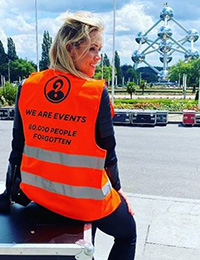B2B Relations in the Events Industry in Europe and COVID-19 Pandemic: the Stakeholders’ View – Part 4
Client Alert | 17 min read | 06.24.20
|
We started this series of alerts by sharing our view on the legal consequences of COVID-19 on B2B relations in the events industry. Our first two alerts set the scene. But of course, law is not applied in a vacuum, and to supplement our analysis we thought it would be useful to understand how different stakeholders from the events industry have been experiencing the pandemic. So, in our most recent alerts, we have been reaching out to different industry representatives, asking them five key questions and inviting them to share their perspective. Freelancers are a driving force in the events industry. Given their large number, we reached out to the freelancers’ working group within the Belgian Event Supplier Association (BESA). The association was created a decade ago by several event suppliers who were struggling to keep up with the number of legal, regulatory, quality and other requirements they were facing. Rather than preparing to celebrate its 10 years of existence, the BESA has recently been in negotiations with the regulators to reboot the events industry in Belgium. Our interlocutor is Virginie Claes, who besides being a freelancer herself, is also the spokesperson of the BESA freelancers’ working group. | 
|
The challenges posed by COVID-19 are unprecedented in business terms. But any company that has been in business for some time must have experienced other crises. What do you think is an important legal lesson that can be drawn from the past?
We have learned some lessons from the impact of the terrorist attacks in Belgium in 2016, from the financial crisis in 2008, and, for some of our members, from individual challenges that they have been faced with over the years. But clearly it was not enough to make us well-prepared for the impact of COVID-19 on our industry. You have to understand that freelancers are at the bottom of the events industry pyramid and often ‘one-man-shows.’ Most freelancers are specialized service providers and at the same time CEO of their business, as well as its secretary, accountant, marketing agency, etc. Our priority is delivering the best possible work for the client. In addition, freelancers often get called in at the very last minute, which makes it challenging to plan, let alone negotiate and conclude, properly drafted contracts. We often make our skills available, by the hour, on the basis of a simple phone call or an e-mail. So you can imagine what happened when COVID-19 caused all the event agencies to cancel their projects almost overnight: the freelancer assignments were cancelled the same morning.
You also have to understand that many freelancers will only receive a written confirmation of their being hired shortly prior to, or even only at, the event. When these events were cancelled because of COVID-19, many freelancers had no proof of the income they had lost and therefore found it difficult to qualify for the relief measures issued by the government. It also turned out that many freelancers were incorrectly registered at the Crossroads Bank of Enterprises and therefore could not access the subsidies they should have been entitled to.
So if we did not learn enough lessons from the past, we are learning for the future. Use of decent contracts, correctly registering the entity, requesting advance (at least partial) payment instead of agreeing to payment after the event, etc.
Everyone is gradually aware that after the lockdown it will not be business as usual. The government is trying to respond to this by announcing numerous support measures and new regulations, temporary or otherwise. If you could amend the existing regulations on one point today, what would that be?
This is a difficult question because some of the changes that are most urgently needed are not directly linked to the current crisis. COVID-19 has made the urgency more pressing, however. A good example is the need for a joint committee. Many freelancers are earning a marginal wage, if they add up all the flexible, late and numerous hours that they actually spend preparing for and working at events. We assume that in the aftermath of COVID-19 even more flexibility will be expected from freelancers, so at least some basic guarantees about working conditions are required.
As for new regulations that are directly linked to COVID-19, I believe every freelancer would opt for a system of subsidies that is more in touch with how our industry works. The events sector is too diverse to simply treat every stakeholder in the same way. Some will be less impacted by this crisis and will recover faster from it than others. It would be sensible to make more means available to those that have fewer financial reserves or a more acute need. In that regard, freelancers face the additional problem that even as public events are permitted again it will still be several months before those events take place and their services are required. As said, we are at the bottom of the event pyramid.
What do you expect from your commercial and legal partners in anticipation of a normalization of the market in the short or medium term?
This is an easy question. We expect our commercial partners to treat freelancers fairly and with empathy. We may not (yet) have the custom to conclude contracts, but we expect agreements that have been made to be honoured. Unfortunately some of our members have already been confronted with COVID-19-related arguments being used to justify non-payment or delayed payment. Fortunately these incidents still seem to be the exception and not the rule.
We also have some more general expectations from a legal point of view. Our members have had a lot of time to think about a post-COVID-19 way of working. We realise that we need to raise awareness within our ranks and make certain documents readily available. A decent services agreement, for instance. Documentation explaining the importance of being correctly registered, or clear agreements on intellectual property related to concepts, formats, technical innovations, etc.
When talking about risk management, a first reflex is often: insurance. It may be assumed that it will not be easy to get COVID-19 related risks insured. How do you nonetheless try to limit COVID-19 related risks as much as possible?
Infection at events is a genuine concern for many freelancers. Many of us are on the frontline during an event. Internally, that risk was one of the drivers for developing best practices with regard to hygiene, for instance when using conference equipment. Externally, it pushes us to start a conversation with our partners about liability. The last thing we want is to be held jointly (let alone solely) liable if event attendees get infected. To us, this seems normal as we are the last shackle in the event chain. In the past, we would have assumed that event organisers would have agreed. We have now learned – some of us the hard way – that assumption is not enough to reduce our risk. So, going forward, we will try to obtain contractual guarantees in this regard. That, and making sure that we get fair payment for work that has been well executed, regardless of whether an event actually takes place, should mitigate our biggest risks.
Virtual or hybrid events, new sponsorship techniques, performance on screen rather than live, augmented and virtual reality... Many see the COVID-19 crisis as a catalyst for innovation. Does this also apply to you? If so, should this innovation be a common good for the whole sector (e.g., through free licenses) or a means for each stakeholder to stay ahead of the competition (e.g., by enforcing exclusive rights)?
Innovation in the events industry has always been important, but it is true that COVID-19 has provided the possibility to accelerate innovation, even incrementally.
Although we were already aware of the value of new concepts for events and of the protection that might be offered to these through intellectual property rights, most freelancers never bothered to protect the fruit of their creativity and ingenuity, let alone make clear agreements with their events partners to help turn that creativity into a reality.
However, agreeing on who owns which aspect of certain creations or innovations will not solve the most pressing issue. We have witnessed many impressive examples of using state of the art technology combined with incredible creativity that have resulted in completely new event formats that events agencies are eager to pitch to their clients. And yet, when even classic corporate clients are presented with such innovative (and COVID-19-proof) alternatives, they typically do not book them, despite being very impressed by the technical possibilities. And often the reason is simple: the lack of the live experience. And it is for a live event that freelancers can make a real difference, be it as venue scout, stage manager, presenter, light engineer, etc.
Contacts
Insights
Client Alert | 3 min read | 02.27.26
On February 17, 2026, the U.S. Equal Employment Opportunity Commission (EEOC) filed a complaint against Coca-Cola Beverages Northeast, Inc., in the United States District Court for the District of New Hampshire, alleging that the company violated Title VII of the Civil Rights Act of 1964 (Title VII) by conducting an event limited to female employees. The EEOC’s lawsuit is one of several recent actions from the EEOC in furtherance of its efforts to end what it refers to as “unlawful DEI-motivated race and sex discrimination.” See EEOC and Justice Department Warn Against Unlawful DEI-Related Discrimination | U.S. Equal Employment Opportunity Commission.
Client Alert | 6 min read | 02.27.26
Client Alert | 4 min read | 02.27.26
New Jersey Expands FLA Protections Effective July 2026: What Employers Need to Know
Client Alert | 3 min read | 02.26.26



